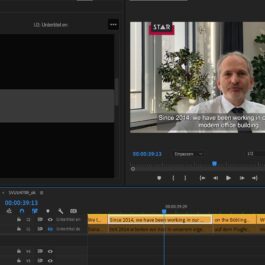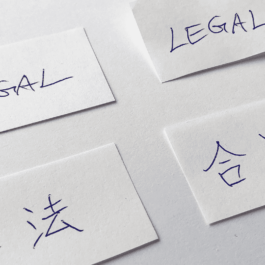Fabienne, Nadège and Frank are specialist translators for STAR Deutschland, working into their mother tongue, French. In this interview, they tell us about their job, their daily work life and the challenges and experiences that they have encountered over time.
STAR: Can you please tell us why you decided on a career as a translator?
Nadège: I was always interested in languages, and German especially. When I completed my school leavers’ exams, the French Baccalaureate, I majored in Philosophy, French, English and German. I definitely wanted a career that had something to do with languages. So that’s why I chose a translation course, with German as my first foreign language and English as my second.
Fabienne: Foreign languages were always a hobby for me. For my German Abitur exams, I took three languages and afterwards, I studied German and Romance Studies in France and Germany. I gained my Masters degree in Heidelberg. It’s a fascinating job, seeing as you must always be up-to-speed with at least two languages and be constantly aware of current developments in both countries. Language is in a state of constant flux and there are many neologisms that have to be integrated into the texts we’re translating at the moment.
Frank: I studied engineering and was always interested in languages. I wanted to bring the two together. I have always enjoyed looking through technical publications to find the French equivalent phrasing.
STAR: French native speakers are often very proud of their language. Is that the case for you, and what is so special about your mother tongue?
Nadège: Yes, indeed! I am proud of my native language. French is a very beautiful language, but it’s also relatively complex. The grammar is not super simple, and there are a great many exceptions to the rules.
Fabienne: French has this legendary reputation for being a difficult language, but what about Chinese or Hungarian or Thai with their non-Latin alphabets and their many eccentricities? Speaking completely “objectively”, I do think that my language is beautiful. The way it sounds, the extensive nuances, the complicated rules as well as those silent letters and word endings that can pose quite a challenge. I can give you an example of a nice, not-too-technical false friend: “car” in French is not the family car you might picture, but rather a coach.
Frank: When it comes to the technical side of things, I have to admit that French is lacking in comparison to German or English. It is always a challenge to faithfully reproduce complicated technical texts. French does not use compound nouns, so you can’t just stick individual words together to make new ones. This makes translation harder.

Our specialist translators, Fabienne, Nadège and Frank (pictured here with Bob, second from right)
STAR: What challenges do you need to master as part of your everyday work?
Nadège: One of the daily challenges would be translating highly specialised texts, for instance, because they use a very specific set of vocabulary. It might be a legal text or complicated technical concepts, which require a lot of research. Aside from that, we sometimes encounter metaphors or a play on words that is difficult to translate because the target language doesn’t have an equivalent. Sometimes it is the type of text that provides the challenge, say if there are length restrictions that need to be complied with. The translations must still be understandable despite being shortened and that is not always easy.
Fabienne: Over the years, clients’ requirements have increased and the complexity of the texts require more research. There is sometimes enormous time pressure on a delivery deadline and there are certain particularities that are unique to each customer and that sometimes contradict each other. It’s certainly never dull, and being flexible is a distinct advantage.
Frank: I translate texts that are often very specialised and require previous knowledge. Source texts are not always written well and sometimes you lack context; particularly for very short translations or supplements to a text that I didn’t previously work on. Many translations also go through an approval process, but the reviewers do not always have the same desires and expectations. That makes my work harder. Marketing texts are often very tricky because you need to take a step away from the original text. Generally, they take longer than a purely technical text.
STAR: On that note, is there anything that you would like to say to the authors of texts that you will subsequently translate?
Nadège: As an example, with texts that have length restrictions, I would like the authors to be aware of the fact that a translation is sometimes longer than the original text. For some texts, the context is completely lacking. In this situation, it is always helpful to send reference files, such as screenshots or images, to help avoid any misunderstandings.
Fabienne: The writers of source texts should keep in mind that the text will be translated and that their slogans, claims, idioms or jokes cannot always be translated exactly into a foreign language. In these cases, I always try to find something new, idiomatic or fitting so that the French text has the same effect.
STAR: What do you think about machine translation? What opportunities and risks does it present for your profession?
Summary of the answers from all three translators: Machine translation has advanced at a rapid pace and the advantages it brings cannot be ignored as it offers cost and time savings. Its output will always be better when it is trained with high-quality, correct and approved reference material.
Having said that, the results are often unreliable and not always coherent. Correcting and finalising machine-translated output (known as post-editing) requires more concentration than simply working with standard reference material. Simple technical texts are often correctly rendered by MT engines, but for complex passages, we believe a translator is still required.
It is a new kind of translation, a completely different skill. As human translators, our job is to detect the intricacies and nuances. The devil really is in the detail!
I’m not currently worried about the future of my profession, as it is not yet possible for machine translation to replace a human translator for legal texts, advertising and marketing texts as well as other specialised text types. Time will tell!
STAR: Surely your job also gives you cause for laughter, now and then? Can you think of any examples of funny errors or misunderstandings in a source text or a translation?
Fabienne: One example that I recently came across was in a translation that I was proofreading: “Barcode not readable” = “Code bar non lisible”; (instead of “code barre” for barcode, the original translator has put “code bar”, which could be back-translated to mean “nightclub code”).
Frank: In English source texts, I often see “break” where “brake” is meant, and a common spelling error in German texts is “Reperatur” instead of “Reparatur”.
More about our Marketing translations








